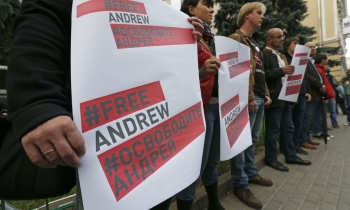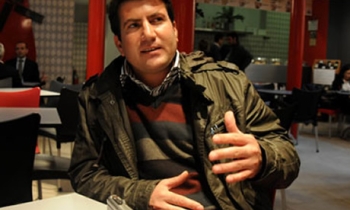MEXICO CITY, Nov. 29 — In a setback for journalistic freedom in Mexico, the Supreme Court ruled Thursday that the governor of Puebla did not violate the rights of a journalist when he had her jailed on defamation charges.
The judges ruled 6 to 4 against the journalist, Lydia Cacho, despite an investigation by one of them that concluded that at least 30 public officials, among them Gov. Mario Marín of Puebla State, had conspired to harass her.
The case has been closely watched in Mexico as a test of whether the country has changed since the days of one-party rule, when jailing journalists and dissidents on questionable charges was a longstanding method of silencing dissent or intimidating the press. Had the ruling gone the other way, Mr. Marín would have been stripped of his official immunity and could have been charged with human rights violations.
“The ruling seems to me a blow to Mexican journalism,” Ms. Cacho said after the ruling. She predicted that journalists would censor themselves because “the Supreme Court has ruled that corrupt politicians always have more power than the victims of crime.”
In her 2005 book, “The Demons of Eden,” Ms. Cacho exposed a pedophile ring in Cancún. She accused a businessman, Jean Succar Kuri, of luring poor, under-age girls to his home and coercing them into having sex with him and his friends. She also mentioned a businessman from Puebla, Kamel Nacif, and said he was paying for Mr. Succar Kuri’s defense. (Mr. Succar Kuri, who is awaiting trial on child pornography and child molestation charges, maintains his innocence.)
In December 2005, Ms. Cacho was arrested without explanation at her home in Cancún, in the state of Quintana Roo, by Puebla state police and driven 900 miles to the city of Puebla, where she was jailed briefly on defamation charges and released on bail. She maintains she was verbally abused during the ride. The defamation charges against her were later dropped.
Later, an audiotape was given to the news media of a conversation between Governor Marín and Mr. Nacif, a political supporter of the governor. On the tape, the two men congratulated each other for Ms. Cacho’s arrest and referred to her in derogatory terms.
The tape prompted many Mexicans, including lawmakers, to call for Mr. Marín’s impeachment. Ms. Cacho, meanwhile, filed suit alleging her civil rights had been violated, and the Supreme Court intervened to investigate.
But a majority of the 10-member court decided to exclude the tapes as evidence, since they came from an unknown source. The majority also found unconvincing the rest of the evidence that Governor Marín and Puebla law-enforcement officials had abused their powers.
The chief judge, Guillermo Ortiz Mayagoitia, said that even if the taped telephone call had been admitted as evidence, it did not prove the governor had colluded with the state courts and the state attorney general “to carry out illegal acts against the human rights of the journalist, Lydia Cacho.”
One of the judges, Juan Silva Meza, who carried out an extensive investigation into the matter, had recommended to the panel on Monday that it strip the governor of immunity from prosecution.
“There was an agreement between authorities in Puebla and Quintana Roo to infringe on the rights of the journalist,” he said. Voting with the minority on Thursday, he said, “I have the conviction that in a democratic state of laws there is no place for impunity.”
Some journalists reacted with dismay to the ruling. “I’m very shocked by what has happened,” said Rossana Fuentes-Berain, a writer and former newspaper editor. “It is a black day both for Mexican journalism and for human rights. I think the members of the Supreme Court, although the vote was split, were not willing to go beyond the technical aspects of the law.”









